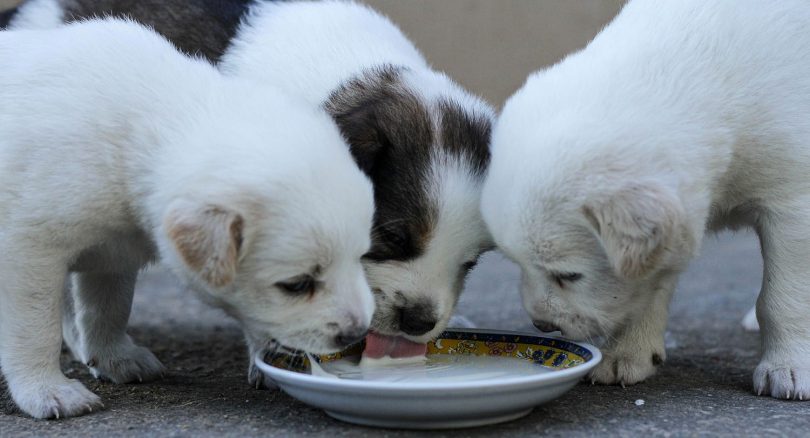We use milk in our coffee, smoothies, and breakfast cereal, as well as the ideal companion for a few cookies at snack time. Is it okay for dogs to share milk, according to many of us?
Can dogs drink milk? If yes, then how much milk is good for my dog?
Let’s see together.
Is drinking milk good for dogs?
At first glance, whole milk appears to be an ideal health food for dogs. Protein, calcium, and the vitamins A, D, and B12 that dogs need in their diet are all found in milk. However, milk is not the best source of these nutrients due to its excessive sugar content.
A diet consisting of 30 percent fat, 30 percent protein, and 40 percent carbohydrates (including sugars) are the ideal ratio for dogs. The ratio in whole milk is very similar: 45% sugar, 30% protein, and 30% fat.
The issue is that all of milk’s carbohydrates are sugars, most of which are lactose. This amount of sugar without complex carbohydrates and dietary fiber is out of balance, even if your dog can tolerate lactose. Because the fat has been removed, reduced-fat and skim milk have slightly higher sugar content per cup.
Is drinking milk bad for your dog?
Even though milk does not harm your dog, it can cause a lot of serious issues in the future. Dairy products are difficult for many dogs to digest because they are lactose intolerant to some degree.
After eating dairy products, lactose intolerance can cause the following symptoms:
- Constant gas
- Flatulence
- Loose stools
- Vomiting
- Abdominal pain
- Diarrhea
- Constipation
If your dog has consumed a lot of milk, it can be difficult to determine if he or she is lactose intolerant; that can also cause diarrhea and vomiting in dogs that aren’t lactose intolerant. However, you should look for a different treatment if your dog exhibits these symptoms after drinking a small amount of milk.
More serious issues, such as systemic disease or poisoning, can also trigger diarrhea. It is essential to understand that dogs’ diarrhea can manifest in a variety of ways.
Due to their high-fat content, most dairy products, especially whole milk can cause your dog to develop pancreatitis, a very serious condition.
How much milk can dog drink?
However, eating small amounts occasionally can be advantageous. Once or twice a week, give your dog a few tablespoons.
You can give your dog small amount of milk few times per week. After the meal, keep an eye out for any intolerance symptoms in your dog.
When should dogs avoid Milk?
There are a few reasons to rethink giving your dog milk, despite the fact that most forms of milk are safe for dogs as long as they do not contain any additional ingredients. Give your dog only organic, animal-based milk if they have any of these health issues.
Can dogs consume milk on a daily basis?
Milk can’t be given to dogs. Cow’s milk should not be given to your dog regularly because the fat, calories, and lactose can cause several short-term and long-term health problems, including diarrhea, obesity, pancreatitis, and stomach upset.
What kind of Milk can Dog Drink?
Consider the kinds of milk:
Dairy milk: Cow’s milk, the most common type of milk, is generally safe for many dogs because it contains a lot of calcium and protein.
However, it also has a lot of lactose, which can make people sensitive to certain foods. Additionally, dairy milk is one of the most prevalent food allergies in dogs.
Dairy-free milk: Lactose-free milk is cow’s milk whose lactose content has been removed. It is one of the specialty milk that can be found in grocery stores. Dogs with lactose intolerance may find it a safe alternative.
Goat’s milk: Goat’s milk, another natural milk derived from animals, is generally safe for dogs and frequently touted as healthier than cow’s milk. It has more protein and less lactose than cow’s milk, but it still contains lactose, has more calories, and has more fat than cow’s milk.
Mother’s milk: Products made from mother’s milk, which are typically sold in the form of powder and are formulated to contain nutrients similar to those found in mother dog’s milk, such as colostrum, a nutrient that can aid a dog’s immune system, are common dog supplements. There is lactose in the mother’s milk.
Milk made from plants: Dogs are typically safe when consuming plant-based glasses of milk like rice milk, oat milk, soy milk, or almond milk. However, plant-based glasses of milk frequently contain a lengthy list of ingredients, in contrast to cow’s or goat’s milk, which contains only one ingredient.
Before giving your pet plant-based milk, make sure to read the label to make sure there are no ingredients that could be harmful to dogs.
Milk flavored: Because lactose is a natural sugar, dogs enjoy milk because they have a sweet tooth. However, flavored glasses of milk frequently contain a lot of sugar or more harmful sweeteners like xylitol, which is harmful to dogs.
Any kind of flavored milk, even plant-based milk, should not be given to your dog.
I hope this information will be helpful for your Dog.







